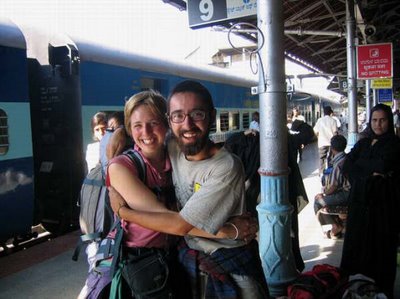Most people will be hard pressed to name any famous Georgians. Some armchair sports fans may be able to name a couple of football players and current affairs buffs may even manage to recall the name of their current president. However few people realise that one of the most influential figures of 20th century history (world history even) was Georgian. The name Iosif Vissarionovich Dzugashvili might not ring many bells, but everyone recognises his nom de guerre: Stalin. During his rule of the USSR from 1924 until his death in 1953 it is estimated that he was directly responsible for the deaths of some 20 million people in various purges and pogroms (making him the second most murderous individual ever after our good friend Chairman Mao, at least according to the following list). Add to that his role in spreading Communism to post-WWII eastern European countries and we get one of the most despised people that have ever lived.
Which is why a visit to Georgia, and more specifically the town Gori, is a surreal experience. This is where Stalin was born and went to school. And to honour their most famous son the main street is called Stalin avenue, there's still a large statue of him in the main square in front of the town hall, and in Stalin park there's a museum to the man himself. The museum feels it unnecessary to bother visitors with the gulags, forced migrations and persecution of intellectuals and instead devotes itself to his childhood poetry, revolutionary works, rise through the ranks of the Communist Party (managing, quite amazingly, to airbrush Stalin's main rival Trotsky out of the entire exhibition) and defeat of the Germans during WWII. The grandiose building is full of pictures of Stalin in various poses and in various media (photos, paintings, carpets, porcelain dishes). In front of the museum building is the house Stalin was born in, standing alone under a grand pavilion. It wasn't moved there and lovingly restored brick by brick, instead the entire neighbourhood that used to surround the house was flattened to make room for the park and museum. And if you were to ask the inhabitants of Gori what they think of their illustrious son the general response would be one of admiration that a local boy became such an important person. A portrait of Stalin in a Gori home is no uncommon sight, some people bake cakes on his birthday and for others the first toast at feasts is reserved for the great man (instead of God). Such selective, collective amnesia is truly scary and I was actually slightly relieved to leave the town (which, apart from its penchant for totalitarian dictators is a rather charming little place). An argument, if ever I saw one, for the importance , and power, of history, and those who control it.
Which is why a visit to Georgia, and more specifically the town Gori, is a surreal experience. This is where Stalin was born and went to school. And to honour their most famous son the main street is called Stalin avenue, there's still a large statue of him in the main square in front of the town hall, and in Stalin park there's a museum to the man himself. The museum feels it unnecessary to bother visitors with the gulags, forced migrations and persecution of intellectuals and instead devotes itself to his childhood poetry, revolutionary works, rise through the ranks of the Communist Party (managing, quite amazingly, to airbrush Stalin's main rival Trotsky out of the entire exhibition) and defeat of the Germans during WWII. The grandiose building is full of pictures of Stalin in various poses and in various media (photos, paintings, carpets, porcelain dishes). In front of the museum building is the house Stalin was born in, standing alone under a grand pavilion. It wasn't moved there and lovingly restored brick by brick, instead the entire neighbourhood that used to surround the house was flattened to make room for the park and museum. And if you were to ask the inhabitants of Gori what they think of their illustrious son the general response would be one of admiration that a local boy became such an important person. A portrait of Stalin in a Gori home is no uncommon sight, some people bake cakes on his birthday and for others the first toast at feasts is reserved for the great man (instead of God). Such selective, collective amnesia is truly scary and I was actually slightly relieved to leave the town (which, apart from its penchant for totalitarian dictators is a rather charming little place). An argument, if ever I saw one, for the importance , and power, of history, and those who control it.
